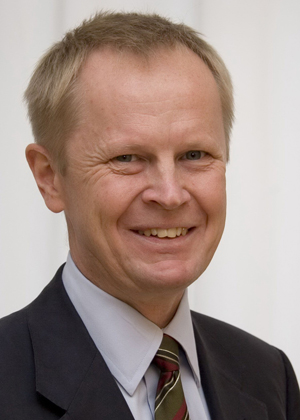On the Open World
Mikael HALEN: “A 10 percent-increase of Internet penetration provides an additional increase of 1 percent of GDP”
The first pilot projects within the program of implementing the Open World national project are starting in fall. The launch of the information-communication (4G) educational network at the national level will help to simplify the educational process for the schoolchildren and make it more efficient. How can one use the international experience to improve this project? These and other questions are raised in the exclusive interview of The Day with Mikael HALEN, Ericsson Director, Government & Industry Relations.
What is your opinion on the national Open World project? Is there anything you would advise to improve it or change for it to successfully start and to be successful?
“I am impressed how the project is worked out in detail. Usually such projects are created focusing on children only, leaving it for the teachers to catch up later by themselves. The Open World project takes into account interests of teachers, students, and parents.
“For the project to be successful I would recommend developing national Internet access network as basic services will be provided over 3G. It’s also important to ensure good coverage not only in schools, but also at home, where students will continue their studies.”
What form of cooperation does the company see in this project?
“We are still estimating our role in the Open World project. In cooperation with the Earth Institute at Columbia University and the United Nations Development Program, Ericsson is involved in a project called the Millenium Villages, under which we currently run educational projects, Connect to Learn, in six countries, e.g. Ghana, Uganda, and Kenya. Ericsson’s contribution in these projects, given its specialization – production and sale of radio and telecommunications equipment/services for mobile operators and cloud computing, consists of two parts. The first part is aimed at providing local operators with favourable terms of broadband Internet access for educational institutions. Second part is for cloud computing.”
Can this practice be applied at Ukrainian market?
“The format of cooperation is not yet agreed, but, clearly, Ukrainian market is very interesting for us and we are studying it closely. It’s too early to speak of some specific arrangements.”
What is other countries’ experience in implementation of similar educational programs, for example, in Sweden? What role is played by the government? Do businesses participate as well?
“In Sweden there isn’t a governmental program or project like Open World. We have a lot of private and public schools. They strongly compete for students by implementing latest technologies for studying. Some buy tablets or laptops for students, others rent them, because it’s quite an expensive purchase. Notwithstanding lack of a state program, our government is committed to make Sweden number-one digital country in the world.”
Nowadays nearly 40 percent of Ukrainians, mostly in the cities, have Internet access. What steps did governments of other states take to improve Internet literacy among population? Are there any cases you think would be applicable in Ukraine?
“The most economically viable way to increase the number of Internet users is mobile broadband, in particular in the more rural parts of Ukraine. It doesn’t require burying cables into the ground or extending fiber optic cable to every home, although fiber is in many cases necessary to connect the radio base stations with. The most important thing is forming equal opportunities of operators to provide 3G and 4G access. Only competition will lead the market to offer quality and reliable MBB products and services at a competitive cost.
“This was exactly the way Sweden chose 12 years ago, and nowadays 99.8 percent of population has Internet access. There are about 1,500 of households that simply refused to have Internet access. How did we manage to reach this? Our government allotted frequencies for 3G, held an auction among mobile operators and obliged the winners to ensure 99.8 percent of the country with Internet access within five years. Although this ambitious goal wasn’t met in 5 years, the process was accomplished in 7 years.”
What is the role of Internet literacy in economic development?
“Ericsson conducted a study together with Arthur D. Little and found that a 10 percent-increase of Internet penetration provides an additional increase of 1 percent of GDP. And every thousand more Internet users creates 80 new jobs. In addition, there is a close dependence between the economic progress and speed of Internet access. For example, in countries where Internet speed is higher, GDP grows 0.3 percent faster each year. This positive effect can be explained by improved automation of all processes and better development of education and medical spheres.
“We expect rapid growth of Internet penetration worldwide: from one billion users today – up to five billion by 2016. Most of them use mobile broadband. Connection to broadband Internet today is the starting point for development of innovation, cooperation, and communication between people.”






